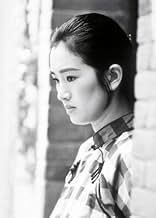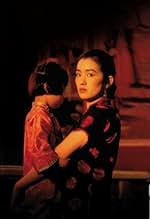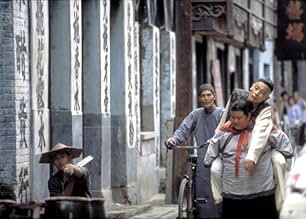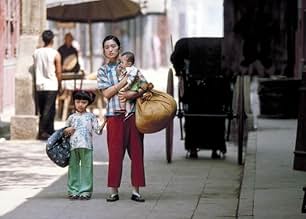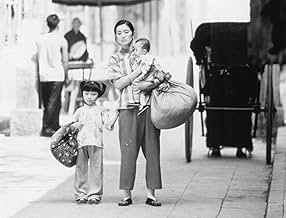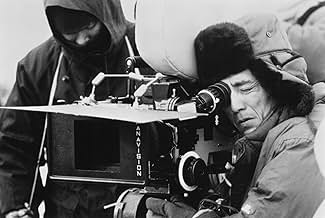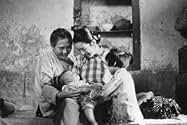Depois que Fugui e Jiazhen perdem suas fortunas pessoais, eles formam uma família e sobreviveram às difíceis mudanças culturais entre as décadas de 1940 a 1970, na China.Depois que Fugui e Jiazhen perdem suas fortunas pessoais, eles formam uma família e sobreviveram às difíceis mudanças culturais entre as décadas de 1940 a 1970, na China.Depois que Fugui e Jiazhen perdem suas fortunas pessoais, eles formam uma família e sobreviveram às difíceis mudanças culturais entre as décadas de 1940 a 1970, na China.
- Ganhou 1 prêmio BAFTA
- 5 vitórias e 6 indicações no total
Avaliações em destaque
'Huozhe' or 'To Live' takes us on a trip in China that will last us from the 40's through the 70's. Through that time, we will see life through the eyes of Fugui and Jiazhen, a husband and wife with 2 children, as well as Fugui's mother.
Fugui, the husband, has a gambling problem which will set off a chain of events that will have them lose the house, and eventually separate the family. Jiazhen, his wife, is forced to take a job which will put a strain on her children. Communist and nationalist armies battle each other, and the rise of Chairman Mao will affect them as well. Fugui will go through layers of mishaps that will change him forever. I don't want to detail anything more about the plot, it's much more worth viewing it and experiencing it then anything I can ever say here.
Not once is this movie boring, effectively placing us there, with the family. The acting seems so natural that it feels like you are there, traveling with them, rather then viewing them through a camera. This of course shows the strength of Zhang's directing. You Ge plays Fugui, a popular actor in China, won the award for the Cannes Film Festival. Li Gong is beautiful, and portrays her character with such passion, it's no wonder she has been nominated nearly a dozen times, winning most.
Emotional without being sappy, honest, & historically accurate, the film does have a black shroud covering it. In times of sadness, it's lifted a bit to allow us to see happiness, indeed, life, pull this family together. It even has bits of humor in it, at times, I laughed along with the family as much as I felt their pain. Little details, such paintings in the background that chip away as time goes by, shows how much care went into making this film. Characters that seem unimportant become part of the story later.
What a wonderful film. When I saw it 10 years ago, it not only changed the way I saw foreign movies, it also changed the way I see life and people. Any movie that can do that is one I highly recommend to anyone.
A perfect 10 out of 10.
I watched this movie because I was taking a class on the politics of China. When I saw that this movie covered such an expansive time period I thought "great, I will learn something." That I did. I cried, I cheered, I stayed up very late... I made my then future husband watch it... he liked it too, not as much as I do.
I tell everyone in conversations about movies that this one is my all time favorite. It took the place of American Beauty, a movie that I have watched about eleven times.
So, I recommend it. If I had a lot of money I would pay people to watch this. It is THAT great.
Most Chinese who lived through Mao's Revolution say this film tells it like it was at the simple townsperson level. Though it can serve as an overview of Chinese history 1944 to 1970 or so, unlike Lean's "Gandhi" or "Lawrence of Arabia", this is not a hero's biopic. Instead we see a foolish, once rich but now fallen heir and his wife blown about by the winds of fortune for three decades and challenged as parents trying to raise two children under increasingly harsh and punitive communist tyranny. What you sense in this film, that I've never seen before in any Chinese film, is how the ethical and moral principles that have prevailed in Chinese culture for 2500 years - a mix of transcendence and pragmatism, humility and grit, cosmic harmonic balance and social duty - allows an ordinary couple to accept unbearable tragedy and keep going. It also shows what this survival strategy costs them in their Communist context. The screenplay is full of cosmic irony. It makes us aware, without shouting, that this is just one family among millions. As Yimou's transitional screen message says: "...leaving no family unaffected". It is to that extent, a tribute film.
Maybe ten hours of Kieslowski's "Decalogue" might accomplish the same broad survey of of human happenstance and emotion. Maybe Kurosawa in three or four hours. But never in two plus hours have I seen the scope Zhang Yimou achieves here. "To Live" also contains as wise a moral lesson as any film I've seen, and it's a gentle one despite the surrounding violence. I couldn't paraphrase the lesson for you. I wouldn't try. Just watch. It will reach you non-verbally in about 90 minutes. Just know, this isn't Shakespeare, Hollywood or soap opera. It's something else.
Gong Li's work is as powerful as anything Streep or Sarandon have ever done in the west - which is all the more inspiring since the camera doesn't lavish star-level attention on her. As her husband, Ge You turns in an emotionally riveting, charming, sometimes funny and devastatingly honest performance. The direction is sure handed, the shooting unfailingly gorgeous. Zhang Yimou's cinematic canvass has never been so big or his palette so colorful and controlled. Full of spectacle, great sweeps of time and onrushing tides of humanity, "To Live" is still, in the end, a sweet and poignant epic with an intimate, observant heart. Great story telling. Do not miss! Try to view a letterbox version on a big screen.
Lantern was precisely contained within narrative walls, it abstracted life by placing us in the midst of turning cycles of life and wove cloths out of that turning in the form of rituals that marked passage; color, sound, weather, architecture. It was akin to a Buddhist mandala to me, a cosmic picture directing me to find my own place in the center of things, choose repose over madness.
Zhang by contrast here wanders unconstrained, under the auspice of history, aiming for a full chronicle of sorts of Chinese life as a family moves through the decades. The stage backdrop changes frequently; Civil war, Great Leap, Cultural Revolution.
We do still have the turning of cycles and it does create a (cosmic) picture; a life of comfort squandered by the man's ignorance who loses it all, to one of hardship and quiet abiding. But eventually it doesn't direct towards a center that will illuminate the turn as something more than the ramblings of history.
And it's simply not a very enviable position to want to be the chronicler of history like Zhang is trying to here, it reminds me of how Kusturica stifled himself in similar endeavors. It means our reference point always has to be an externally agreed version of reality and we have to be chained to that sweep.
You can see him try to root himself in something more essential - the husband becomes a puppeteer putting on shadow plays for the people, life as the canvas where these evanescent shadow plays are enacted, now losing a fortune, now gaining back your family, so that we could see it from the distance of transient flickers of drama. Civil war is introduced as someone hacking down the screen, revealing war as another play that demands its actors assume their place.
But this is forgotten in lieu of stopping at various points of history so that it ends up being more the Oscar winning type than history parting to reveal myriad reflections like Andrei Rublev. Had it come out from the West, I'm sure it would have won a few and the wonderful Gong Li her first. The best I got out of it eventually was the sense of a man and woman trying to make their way together as the skies shift and the stage quakes by the ignorance of unseen puppet masters enacting their little plays. The Great Leap castigated as a wall collapsing on a little boy, because the man who crashed his car and the boy were both overworked and needed sleep.
Zhang took care to color history within certain lines so that we veer close to the monumental failures of the era but never quite see the full brunt of the horror, famine or mass persecution, only bits of abuse in passing. It was still banned by Party hacks anxious to control the play.
It is easy to dismiss this movie as a "Sad period piece," but with another look, one sees that this is a story about triumph... of taking heart in the fact that one lives. The title, "To Live," is very apt, as we see the rises and falls of one small family living through the ups and downs of China during the pre-revolutionary era, the civil war, the Great Leap Forward, the Proletariat Cultural Revolution, and beyond.
This movie is at turns dramatic, humorous, touching, chilling, heart-wrenching, and triumphant. A true roller coaster of emotions, played out in the subtle tones only Chinese film can truly capture.
Você sabia?
- CuriosidadesInitially, Director Zhang Yimou was forbidden from filmmaking for 5 years by the Chinese Communist Party as a result of making this film. However, due to outside pressure this was later withdrawn.
- Citações
Little Bun: [playing with chickens] When will they grow up?
Xu Jiazhen: Very soon.
Little Bun: And then?
Xu Fugui: And then... the chickens will turn into geese... and the geese will turn into sheep... and the sheep will turn into oxen.
Little Bun: And after the oxen?
Xu Fugui: After oxen...
Xu Jiazhen: After oxen, Little Bun will grow up.
Little Bun: I want to ride on an ox's back.
Xu Jiazhen: You will ride on an ox's back.
Xu Fugui: Little Bun won't ride on an ox... he'll ride trains and planes... and life will get better and better.
Principais escolhas
- How long is To Live?Fornecido pela Alexa
Detalhes
Bilheteria
- Faturamento bruto nos EUA e Canadá
- US$ 2.332.728
- Fim de semana de estreia nos EUA e Canadá
- US$ 32.900
- 20 de nov. de 1994
- Faturamento bruto mundial
- US$ 2.332.728
- Tempo de duração2 horas 13 minutos
- Cor
- Mixagem de som
- Proporção
- 1.85 : 1
Contribua para esta página



